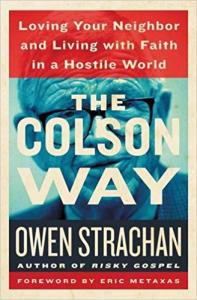 This is not a small question. For evangelicals, the first place we go–and the ultimate source from which we draw–is God’s Word. Scripture is authoritative and normative, not simply for our Sunday gatherings, but for all of life.
This is not a small question. For evangelicals, the first place we go–and the ultimate source from which we draw–is God’s Word. Scripture is authoritative and normative, not simply for our Sunday gatherings, but for all of life.
So our support of marriage–the permanent union between a man and a woman–is grounded in God’s formation of the institution in Genesis 2, Jesus’ own support of marriage in several places (including, notably, Matthew 19:4-6), and the fact that the Apostle Paul attaches cosmic gospel significance to it in Ephesians 5:22-33. The biblical view of marriage, in other words, is not led or informed by other views; it is the blueprint, the foundation, the reality.
Evangelicals can’t help but make arguments grounded in these and other texts in public. We’re not scared of doing so; we’re not shy about this; we’re not up against a wall in this regard. We have utter trust in the Word of God, recognizing not only that it is authoritative, but that it is beneficently authoritative. This is wisdom that is good for all of us, as all of God’s wisdom is.
Beyond this framework, there are a number of arguments we can make about marriage from what you could call a “natural” standpoint. These are helpful, very helpful, arguments that point to the goodness of the institution designed by the mind of Almighty God. The Heritage Foundation, a major thinktank in Washington, D. C., has just released a document outlining these points in clear and persuasive language. It’s authored by Ryan Anderson, probably the sharpest young advocate of marriage, and it is worth our time and reflection.
Here’s a selection from the document, entitled “Marriage: What It Is, Why It Matters, and the Consequences of Redefining It.”
Marriage exists to bring a man and a woman together as husband and wife to be father and mother to any children their union produces.
At its most basic level, marriage is about attaching a man and a woman to each other as husband and wife to be father and mother to any children their sexual union produces. When a baby is born, there is always a mother nearby: That is a fact of reproductive biology. The question is whether a father will be involved in the life of that child and, if so, for how long. Marriage increases the odds that a man will be committed to both the children that he helps create and to the woman with whom he does so.
Marriage connects people and goods that otherwise tend to fragment. It helps to connect sex with love, men with women, sex with babies, and babies with moms and dads. Social, cultural, and legal signals and pressures can support or detract from the role of marriage in this regard.
Maggie Gallagher captures this insight with a pithy phrase: “[S]ex makes babies, society needs babies, and children need mothers and fathers.” Connecting sex, babies, and moms and dads is the social function of marriage and helps explain why the government rightly recognizes and addresses this aspect of our social lives.
This is a valuable piece for Christians of most every kind and background. Pastors will want to know these arguments, for example; while Scripture is our ultimate authority, we evangelicals are gluttons for good thinking and logic, knowing that such are common grace gifts of God, the one who has made the world intelligible and rational.
(Side tangent: In fact, as a pastor, you might want to think hard about doing, say, a Friday night discussion on the biblical and logical arguments for marriage with your church. Don’t assume your people know how to give sound answers on these difficult questions. How can you equip your people? How can you help them?
This is not a fringe issue; this is not you taking valuable time to figure out how your congregation should think about the recent proliferation of cats in your neighborhood. This is you thinking about how you can strengthen your people to meet one of the greatest societal challenges to the Christian worldview in our lifetime. Ethical commercial concluded.)
If you work in a secular workplace, or go to a secular college, or are engaged in discussion with family members and friends about what marriage is (and many of us should and will be), then consider this document a way by which to equip yourself to think logically and carefully. You might also want to pick up the book What Is Marriage? by Anderson, Robert George, and Sherif Girgis. That’ll let you dive into these concepts further.
As believers, let’s do everything we can to try and preserve the institution of marriage–the ground of society, the nurturing unit of children, and the visible display of a love that transcends this world.











